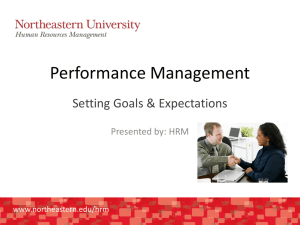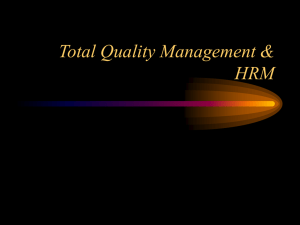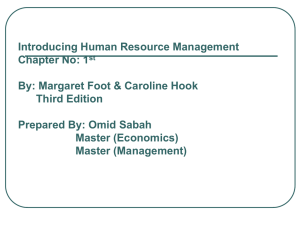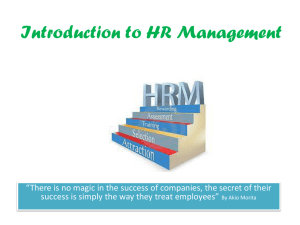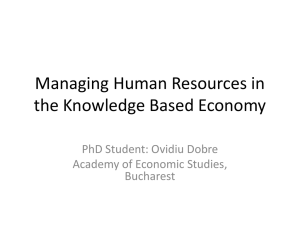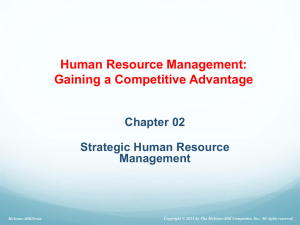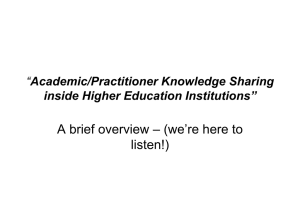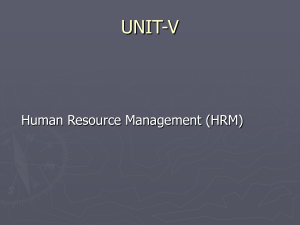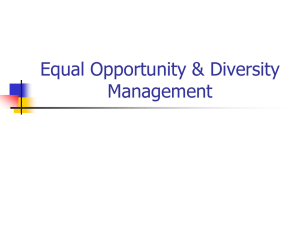File
advertisement
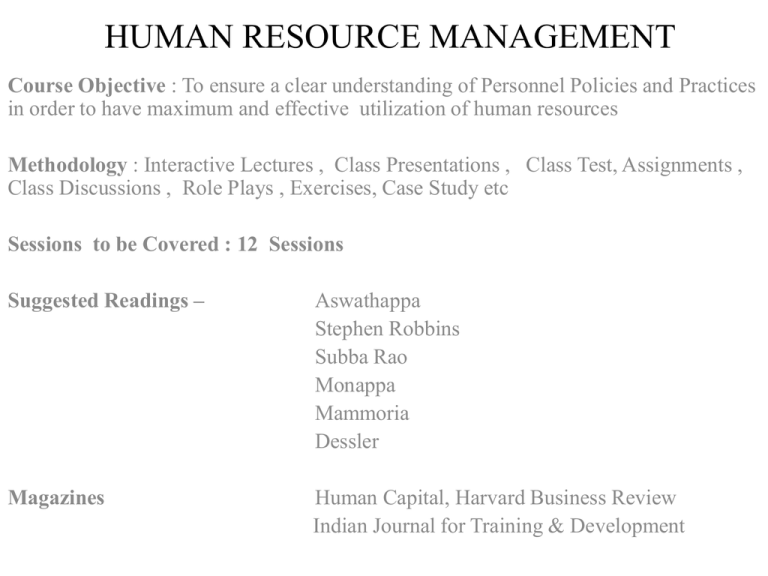
HUMAN RESOURCE MANAGEMENT Course Objective : To ensure a clear understanding of Personnel Policies and Practices in order to have maximum and effective utilization of human resources Methodology : Interactive Lectures , Class Presentations , Class Test, Assignments , Class Discussions , Role Plays , Exercises, Case Study etc Sessions to be Covered : 12 Sessions Suggested Readings – Aswathappa Stephen Robbins Subba Rao Monappa Mammoria Dessler Magazines Human Capital, Harvard Business Review Indian Journal for Training & Development EVALUATION • Semester Exam • Attendance • Presentations 60 10 30 Presentations from 3rd session onwards Presentation rules, topics and tentative dates will be given to CR of the class with groups. Class Session 1---Human Resource Management Outline Definition Meaning of HRM Core Elements of HRM Objectives of HRM Functions of HRM Scope of HRM Role of HRM Challenges of HRM in Indian Economy / Modern Management Relationship with other social sciences – Approaches to HRM / Interdisciplinary approach Newspaper Articles Human Resource Management Definition 1 – Integration HRM is a series of integrated decisions that form the employment relationships; their quality contributes to the ability of the organizations and the employees to achieve their objectives Human Resource Management Definition 2- Influencing • HRM is concerned with the people dimensions management. Since every organization is made up of people ,acquiring their services, developing their skills , motivating them to higher levels of performance and ensuring that they continue to maintain their commitment to the organization are essential to achieving organizational objectives. This is true regardless of the type of the organizationgovt, business education , health, recreational or social action Definition 3 Applicability • HRM is planning, organizing directing and controlling of the procurement , development, compensation , integration, maintenance, and separation of human resources to the end that individual, organizational and social objectives are accomplished. Core Elements of HRM Organizations ------People ------ Management Meaning of HRM It is concerned with management of people from Recruitment to Retirement To select right person, at the right place for the right job. Difference between Personnel Mgmt & HRM HRM PM People as important assets People as a tool behavior of who could be used for the whom could be manipulated benefit of organization and for benefit of the organization society and replaced when worn out ,this department was not treated with respect Aiming at policies and One way traffic promoting mutuality – goals, respect, rewards & responsibilities In turn better economic Emphasis on only performance and greater performance HRD Difference between Personnel Mgmt & HRM A part of strategic business Eg – ICICI Bank every unit of ICICI Bank is a profit making center New add-ons like training programmes could be invoked in HRM Not considered a part A routine activity meant to hire new employees having fixed grades & to maintain personnel records. HRM OBJECTIVES AND FUNCTIONS HRM Objectives Supporting Functions Societal Objectives Legal Compliance SAILs basic objective is customer satisfaction Benefits Union Management Relations Organizational Objectives HRP TVS Suzuki- emphasis of the company are Employee Relations People and quality through quality Selection circles Training and Development Appraisal Placement Assessment Functional Objectives Appraisal Reliance – KRA based on PMS & career mapping exercise, Mfg leadership prog for its senior execs in association with Hewitt Placement Assessment Personal Objectives Training and Development Eg- DuPont Nylon – a development Appraisal, Placement, Compensation Center created for employees, team bldg SCOPE OF HRM HRM starts from the employees entry till the exit of the same and hence covers everything under the sun . Activities HR Planning Job Analysis – JD &JS- Eg Wipro – implicit JA & Nirma – explicit Job Design eg- Bajaj Auto- job rotation and job enrichment Employees Hiring --Recruitment & Selection Orientation & Placement, Training & Development eg Dupoint Saint Goabain Satyam –team work practiced, Punjab TractorIndvidual SCOPE OF HRM Employee and Executive Remuneration Eg-infosys prefers low base of salary& individual negotiation , L&T prefers collective bargaining Employee Maintenance – Motivation, Communication eg BPOs ,Reliance – PLI for its employees with international cons, Google Performance Appraisals, Job Evaluation Eg- Polaris & Bajaj Auto- 1-behaviour 2.on results Industrial Relations – Welfare, Safety& Health eg ONGC, Role of HRM Advisory Role Personnel Policies Personnel Procedures Functional Role Service Role Eg – Google HR Managers Today Humanitarian Role Counselor Mediator Spokesman Problem Solver Change Agent Future Enhancement of Human & Non Human Resources Maximization of people to achieve organizational goals Synergizing IT with HR Managing diverse workforce Managerial functions of HRM Planning- plan & research about wage trends,labour mkt etc Organizing- manpower and resources Staffing- recruitment & selection Directing- issuance of orders and instructions to follow plan of action Controlling – to regulate the activities Operational Functions of HRM Procurement- planning , Recruitment & Selection , Induction & Placement Development – T & D, Career Planning & Counseling Compensation- Wage & Salary administration Integration Maintenance – improving work conditions, retentions Separation - caused by resignations, retirement, death, medical reasons etc CHALLENGES OF HRM IN INDIAN ECONOMY World becoming a Global Village eg-GE, ranbaxy, Glaxo, TCS Corporate Re-organizations eg- Air India & IA, New Organizational Structures- Virtual , boundary less , flat , Wipro – diversfcn – soaps,edible oils etc Forward & Backward Intg Backward integration M&As Diverse workforce- eg. Teenagers, Nuclear families, working mothers etc Gen Y Change in Employee Expectations- more of benefits People Focus – concept of flexi time –huges software, L&T – nanhi kali, TCS joined Tata Mgmt Training Center for balance scorecard & other systems like PMS , Protection of Interests of Weaker sections Employee Engagement Attrition Approaches to HRM / Interdisciplinary Approaches Changes in Organization Design 1950s 2000s Broad Banding Multiple Layers Flat/ Delayered Few levels Mfg/ lab intensive Autocratic Very less control Team Focused Adaptive/ Mobility Tight ownership Flexible Empowerment Merit Pay Centralized Individual Decentralized Contributors Narrow Externally Responsibilities Focused Few Rules Market Driven Line & Staff Relationships in Organizations Relationship which the managers in an organization deal with one another are classified into two categories Line and staff Line Relationship - authority and responsibility Receiving and giving instructions or orders. Important as one gets work done through people. Staff Relationship –giving and taking of advice Line Staff Relationships in Orgn General Mgr Blue – Staff Relationship Black – Line Relationship Mkt Mgr Dy Mgr Officer Officer Fin Mgr Dy Mgr Prod.M gr Dy Mgr Officer Officer Sales Asst HR Mgr Dy Mgr Officer Asst Asst Organization of Personnel Department 1. Its concerned with the relationships of management to employees 2. Its concerned with the relationships of employees to employees in all matter 3. Personnel department is staff deparment and has a structure of line type 4. Organization of personnel function depends on the size, structure, range and depth of actions, needs, capacities, nature and location of organization. 5. The degree to which the organization takes personnel function seriously • Scale of operations large – a separate department is essential Organizational Structure Personnel Department Organizational Structure Personnel Department Personnel Department Personnel Department Eg- Hospitals Personnel Department Eg-FMCG colgate Palmovlie Levels of Management 3 HR Dept Vice President HR 3 Managers ( Functional & General Employees Personnel Department -g- Pharma cos Merck Organization Structure Levels of Management 3 HR Dept Structure Vice President HR Sr. Executive HR Executive HR Responsibility of Personnel Specialist Human Resource Planning Formulation of Programmes & Procedures Employee Health & Safety Programmes Training and Development of Personnel Wage & Salary Administration Good Labour Management Relations – Grievance handling Employee Benefit Programmes Personnel Research Personnel Audit & Review Work Airport Authority of India • Functions of Personnel Department Formulating policies & procedure Manpower Planning Training & Development Recruitment & Promotion Service Condition Wage & Salary Administration PAS & Counseling Formulation of various welfare schemes Functional Chart of AAI Chairman Dep't under Board Members OPS Corporate HQ Finance Per &A Finance & A/cs Commercial Internal Audit Land Mgmt Consultancy Secretary Planning Corporate HQ Public Relations Regional HQ Projects Airports Vigilance Personnel Department Indian Oil Corporation Executive Dir HR GM HR DGM HRD T&D HR/Personnel Dept Shoppers Stop VP HR Corporate Mgr HR Training Manager Asst Mgr Training Analyst Officer HR Mastek A mix of functional & Matrix Organization 3 Center Heads Corporate HR Manger Mastek Development Cell Personnel Mgmt OD Training Career Path Oberoi Hotels Sr.VP HR Director HR Training Human Resource Summary HRM is a tool that helps managers to plan, recruit, select, train, develop, remunerate, motivate and make maximum utilization of human and non human resources for the organization and society at large. “One machine can do the work of fifty ordinary men. No machine can do the work of one extraordinary man.”- Elbert Hubbard

